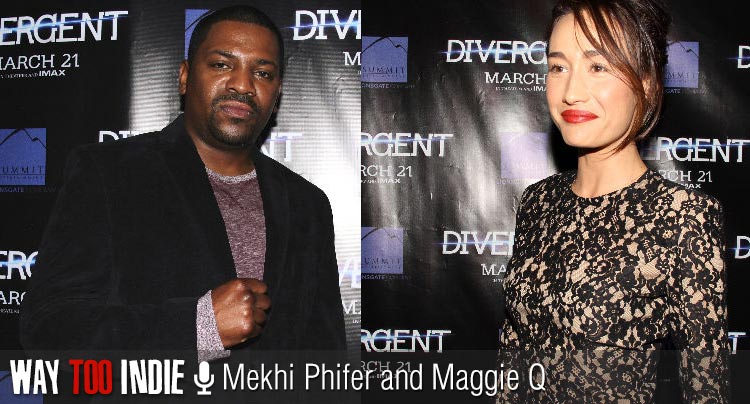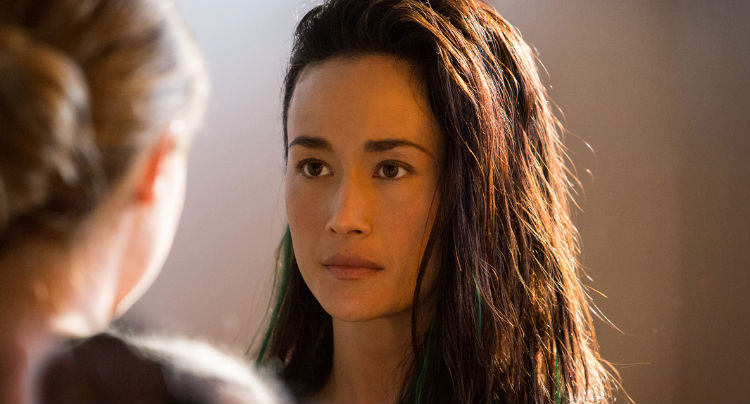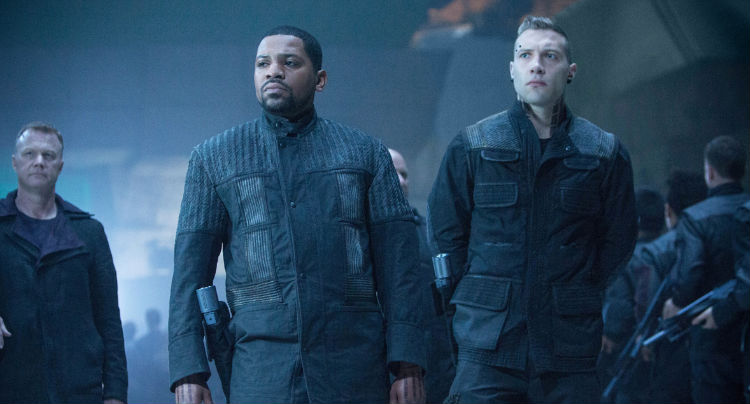Mekhi Phfifer and Maggie Q Talk ‘Divergent’, Breaking Stereotypes

This Friday, Divergent drops on the masses, looking to cultivate a the same kind of ravenous YA fan base that made Twilight and Hunger Games so goddamn bankable. (The second installment of Hunger Games I quite liked, proving these kinds of films don’t have to be reduced to cash-grabs.) The Divergent book series has already amassed a gigantic, devoted following, so now it’s just up to the creative minds behind the film to follow through.
We had an opportunity to sit down with two of the stars of the Veronica Roth novel adaptation, Maggie Q, who plays shadowy tattoo artist Tori, and Mekhi Phifer, who dons a badass black jacket as Max, the leader of Dauntless, one of five factions that make up the world of Divergent. Directed by Neil Burger, the film also stars Shailene Woodley, Theo James, Kate Winslet, and Miles Teller.
In the edited press roundtable interview below, the actors spoke to us about how it feels to be involved in such a huge franchise, what characters they’d like to play other than their own, navigating the movie industry as a minority actor, and the importance of saying no to stereotypical roles.
Divergent opens this Friday, March 21 nationwide.
What drew you to the project? Secondly, have you read the books, and do you know the fates of your characters?
Mekhi: First and foremost, in our profession, what draws you into any [project] is not only the people you’re going to potentially be working with, but the quality of the script. That’s first and foremost. Neither one of us knew about Divergent at all. What drew me to it was that it was just good. Then, you have Neil Burger, Kate Winslet, Ashley Judd–all of these other great people in it. It’s hard not to want to be a part of something so special. Then I spoke to my agents and people who knew the series, and they were extremely excited.
Maggie: You have to have faith in their assessment. They’re like, “You don’t understand!” and you’re like, “You’re right! I don’t!”
Mekhi: We sort of pseudo know [the fates of our characters]. We don’t have the script, but things could change. Who knows.
Maggie: Adaptations are funny. It depends.
Mekhi: There’s a certain artistic license we’re taking with the adaptation. It’s not necessarily literal to the book. I’m sort of twisting in the wind. I don’t know what’s happening. (laughs)

Maggie: [As for what drew me to the project,] the script is first and foremost, whether it’s a best-selling book or not. Let’s be honest: there are best-selling books that have been made into movies that are not good. Because adaptations are specific to what they think will work from the book, you kind of have to read the script first and not the book first, to see whether you like the way they’ve adapted it. If you want background, a rooting and education of it, you can turn to the book. We had Veronica Roth on set to help us, too, and it wasn’t a weird thing. It’s [typically] a weird thing to have writers on set: it’s a no-no.
Mekhi: Unless you’re doing TV.
Maggie: Yeah. It’s annoying. But on TV you need them because it’s constantly changing. But on a film that’s a touchy thing.
Mekhi: Usually in film, the [studios] acquire the rights [to the script], and then they say “get out of here” [to the writers].
Maggie: I don’t know how writers don’t jump off buildings. Their work kind of makes it on screen, but it takes a lot of passes. [As for the fates of our characters,] I know when she dies. I mean, the books are out, so that’s something the people knew before I did. We just hope that when we die the mourning is so great that people can barely make it! (laughs) This movie sets our characters up: who we are, where we’re going. The next film is going to be very exciting of us.
You guys are officially a part of this franchise now as these beloved characters, with this rabid fan base. If you could play another character in the series, who would you be?
Maggie: It’s hard, because they did such a good job with casting!
Mekhi: I like being Max! (laughs)
Maggie: Imagine if Mekhi was like, “I’d love to play Tris..” (laughs) I don’t know. I mean, I like our journeys.
Mekhi: I like our journeys as well. That’s a good question. Nobody’s ever asked us that. [I would pick] somebody in Dauntless.
Maggie: Yeah, we like Dauntless.
Mekhi: Jai [Courtney]’s character is interesting from a male perspective.
Maggie: But again, he does it well and he’s one of our friends, so I don’t know if I would want to take on what he did. There are so many characters in the franchise. A few die in this one, and then we’ll go on to the next one and see who we kill! (laughs)
Black actors are having a stronger and stronger presence in cinema, even though things aren’t where they should be, especially in television. Asian actors aren’t even close as far as visibility. They’re always type-cast, and it’s irritating. You two weren’t type-casted for these roles at all, which helps in terms of that conversation.
Maggie: It’s fun to be paired [on this press tour] with another minority. We know what it’s like. We know how that box exists. It’s very real. (To Mekhi) I’m sure you were offered every drug dealer role. Every pimp role.
Mekhi: Oh yeah, of course. You’ve got to say no. You’ve got to turn it down!
Maggie: You have to say no. The only power you have is to walk away. You can sit around all day long and whine about what [parts] you’re not getting, but it’s not about what you’re not getting; it’s about what you’re not taking. For me, as an Asian American, I’m looking for roles that are non ethnic-specific. If you come to me and you’re like, “Can you play this flower girl on this boat?”, the finger goes up really fast. The blood boils really quickly. Sure, I or any Asian girl could play that role. If you’re doing a story on history or whatever, that’s totally valid.
When you get roles that are stereotypical and do not push our cause or further our image in media and in entertainment, it’s your responsibility to turn those things down. I’m not saying that from the position of, “I’ve earned enough so that I can say no.” I’ve said no to things when I had no money.
Mekhi: Absolutely.
Maggie: It wasn’t about that. It was about the big picture. Where do I want to go with this? Do I want to make that amount of money for the next six months, and then what? It goes away, and I’d have no further career beyond that. Or, do I want to make smart decisions that are going to change the face of my freakin’ community?!
I was negotiating my deal on Nikita. A copy of the Hollywood Reporter came to my house one day. There was a photo of me, and it said that there was this landmark casting about to happen. I was like, “Ooh…what landmark casting?” I started reading this article, and it said that if I took the deal–I was still negotiating–that I would be the first Asian American lead on broadcast television. I wanted to throw up. There are so many quality Asian American actors out there, but they’re not giving us the lead roles!
What was important to me was not that it was an Asian lead. What was important to me was that it was a lead that was not written for an Asian. Nikita’s always been played by white girls. Always. Warner Bros. took a leap of faith and said, “We don’t want a French girl, or a white girl, or this or that. We want the right actress. And it doesn’t matter if she’s black, or white, or yellow or purple. We want the right person who has the heart of this character. You have it.”
These are not ethnic-specific roles (in Divergent). It’s not like Tori pushes the dim sum cart around the Dauntless vault, you know what I’m saying? But let me tell you…you get those scripts. They come all the time.
Mekhi: Max definitely wasn’t just written for a black man. You want to be good at what you do, and hopefully that helps break down stereotypes.

Mekhi, one of your early roles was in Clockers, and that was a very complex role and not stereotypical.
Mekhi: Right, right.
Later on you were on ER, and it’s that great progression where, you start seeing people in these roles and it no longer becomes specific to a particular ethnicity.
Maggie: You’ve got to walk into the [casting] room and change their minds. You do. I’m like, “Send me into that room where they want a white girl. Now. Send me into that room.” I don’t care. It shouldn’t be about that. They should be open to whatever, but if they’re not, you’ve got to be up for that fight. Half of the time it’s getting the job and performing at a level where you can continue to work. But the other half is that fight, getting into those rooms.
We’re seeing a bit of that now with the Fantastic Four casting. Michael B. Jordan’s a great actor. I think people will start turning, open up, and change. They’re fictional characters.
Maggie: We do live in the United States. What are we talking about? If we can’t be diverse here…I don’t understand how that’s even possible. It’s very, very strange. It’s also a global market now, too, which is why it’s changing. Some of it is that attitudes are changing. Some of it is that certain parts of the world–Latin America, Asia–we’re selling half the world, baby. You’ve got to put [actors] in positions where people in other parts of the world can relate to what you’re throwing on screen.
I’ve seen a lot of progress because of the global market, number one. Two, you have to get out there in a way where people actually know you as an individual. It’s about people knowing and liking you as a person first, seeing your work and appreciating it for what it is.
Mekhi: I’ve turned down money [before] because I was either going to be making lateral movement or going down as far as the way I was being perceived by the public and fans. There are jobs that I wouldn’t take, but then there’d be this job that would take you to another level.
Maggie: You’ve got to be patient, have faith in the process, and also know that you have something to offer that’s real. Then, it’s really all about what actually matters.
Mekhi: If integrity matters to you and you want to be an actor, when you get those jobs, save your money so that you’re not a slave to the system.
Maggie: I got the best letter ever. When we get scripts, there’s always a cover letter on it that says, “In anticipation of our conversation,” or “As per our conversation, here’s the script, here’s the director, here’s who’s in it.” There’s always this cover letter. To be fair to my agent–who I’ve been with for ten years and who I love–there was a bunch of scripts I was delivered. He was in Paris, hadn’t seen them, and had them sent over. I got this script–I’m not going to tell you what movie it is. “In anticipation of our conversation, please find the script written by ‘blah blah’, starring ‘blah blah’.” I shit you not, it said, “Please take a look at the role of ‘The Chink’.” You can’t make it up. That’s the name of the character.
It’s framed in my office, because I want to always be reminded of what’s out there. First of all, I’m going to punch this writer in the face! Just let me know where he or she lives. Then, they were like, “It’s kind of a cool character!” Super racist. A very talented Asian actress ended up taking the role. A very talented Asian actress. You’ve got to say no.
